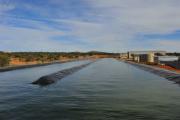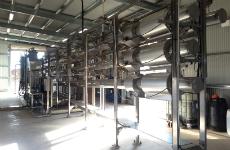Hydrothermal Liquefaction

Muradel: Micro-algae facility
Hydrothermal liquefaction (HTL) is biocrude oil production using biosolids from wastewater treatment and waste biomass.
It is one of the leading methods to convert complex organic feedstocks such as biosolids from wastewater treatment and other waste biomass feedstocks into valuable products like transport fuels and their precursors. Australia’s first integrated demonstration plant using HTL was opened by Muradel in Whyalla, SA.
About hydrothermal liquefaction
In comparison to other technologies for production of biocrude, HTL has the advantages of being:
- compatible with wet feedstocks (so there is no need to dry it);
- a more direct and efficient chemical process that utilises all of the biomass;
- upgradable to a range of drop-in fuels in conventional petroleum refineries.
HTL operates with subcritical water at pressures of 10-25MPa and temperatures between 280-375°C acting as a solvent that facilitates the breakdown of the carbonaceous material into to biocrude components. A range of organic compounds – and in fact the entire biomass – can be used with good conversion efficiency. Furthermore, HTL is well suited to a range of wet feedstocks, including biosolids, which are also known as waste activated sludge (WAS).
ARC linkage projects

Muradel: Reactor
At Muradel’s Whyalla plant, HTL is performed in a continuously operated subcritical water reactor at ~3 tonnes of 20% w/w solid feedstock per day. As HTL technologies are not yet commercially available and are typically feedstock specific, Muradel’s reactor is globally significant; it is relatively feedstock agnostic and also relatively energy efficient.
Despite its advantages, the existing reactor cannot be scaled up with existing knowledge to commercial scale due to scientific and technological challenges. The Centre for Energy Technology in partnership with Muradel have been awarded an ARC Linkage funded project with the overall objective is to develop the new knowledge and engineering tools required to achieve commercially viable processing of biocrude at a large scale. Within this project are the following tasks:
- Development of kinetic models for HTL of various feedstocks including biosolids;
- Determination of viscosity of HTL reacting mixtures with various temperature-time histories of the reaction;
- Determination of heat transfer characteristics of continuous HTL reactors;
- Development of computational fluid dynamics models to aid in scaling up and optimising continuous HTL reactors;
- Sensitivity analyses of parameters during operation of HTL to assess means by which biocrude oil yields and quality can be optimised.
CET researchers working on ARC linkage project
- Professor Gus Nathan
- Professor David Lewis
- Professor Peter Ashman
- Associate Professor Zeyad Alwahabi
- Dr Philip van Eyk
- Dr Zhao Tian
